

The Seven Secrets of 2020 by Yanis Varoufakis. This year has resembled a rapidly receding tide, forcing us to confront submerged truths.

One lesson we learned in 2020 is that national governments had been choosing not to exercise their enormous powers so that those whom globalization had enriched could exercise their own. ATHENS – A house of cards. A set of lies we have unconsciously accepted. That’s what our certainties seem like during profound crises. Such episodes shock us into recognizing how unsafe our assumptions are. We used to think, with good reason, that globalization had defanged national governments. Reinventing Workers for the Post-Covid Economy. “2020 seems to be turning around,” Mr.
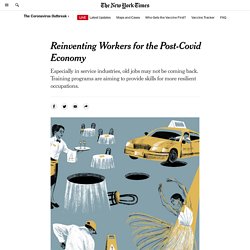
Sooper said. “I’m feeling pretty confident. Why you shouldn't fall for the panic about Britain's public debt. A number of journalists, politicians and observers have become increasingly concerned about the mounting quantity of public debt involved in the UK’s coronavirus response.
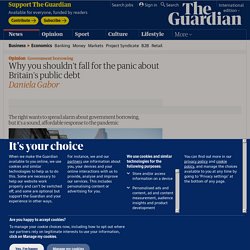
These “quantity vigilantes”, as I like to call them, worry that public debt has been growing at unprecedented levels since the pandemic began, passing 100% of GDP – a level not seen since 1963. This record peacetime deficit will only mount as the second wave of coronavirus hits jobs, investment and spending across the British economy. So how bad will it get? To some alarmists, what awaits us is no longer simply the “sacred responsibility” to balance the books for the next generation – that old Conservative trope marshalled to legitimise austerity – but something far worse: an impending currency crisis.
This conclusion is worrying. To see why, you need to understand how government borrowing works. The DMO issues bonds, or “gilts”, typically at five-, 10- or 30-year maturities, and also uses short-term cash instruments. Saving Generation COVID by Abiy Ahmed & Gordon Brown. During the COVID-19 crisis, lockdowns and other social-distancing rules have forced schools worldwide to shut their doors, locking out a peak of 1.6 billion children.
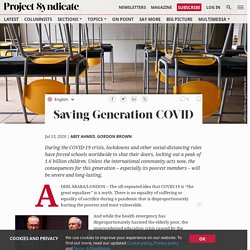
Unless the international community acts now, the consequences for this generation – especially its poorest members – will be severe and long-lasting. ADDIS ABABA/LONDON – The oft-repeated idea that COVID-19 is “the great equalizer” is a myth. There is no equality of suffering or equality of sacrifice during a pandemic that is disproportionately hurting the poorest and most vulnerable. And while the health emergency has disproportionately harmed the elderly poor, the unprecedented education crisis caused by the pandemic is now hurting the poorest children hardest and creating a generation that will lose out on learning. Lockdowns and other social-distancing rules have forced schools all over the world to shut their doors, affecting a peak of nearly 1.6 billion children.
UN chief slams 'myths, delusions and falsehoods' around inequality. The UN secretary general will today deliver one of his most stinging speeches to date, attacking the “myths, delusions and falsehoods” around international progress on equality.
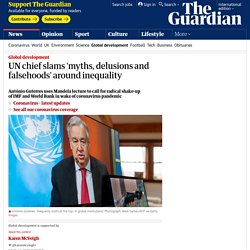
In an unusually strongly worded speech, António Guterres urged major reform to the UN security council, the International Monetary Fund and the World Bank, to address systemic inequalities exposed by the coronavirus pandemic. The health crisis had revealed the world’s fragility and “laid bare risks we have ignored for decades: inadequate health systems; gaps in social protection; structural inequalities; environmental degradation; the climate crisis”, he said. He said the pandemic was exposing “fallacies and falsehoods everywhere: the lie that free markets can deliver healthcare for all. The fiction that unpaid care work is not work, the delusion that we live in a post-racist world, the myth that we are all in the same boat.”
“Let’s not fool ourselves. China Dominates P.P.E. Manufacturing. BEIJING — Alarmed at China’s stranglehold over supplies of masks, gowns, test kits and other front-line weapons for battling the coronavirus, countries around the world have set up their own factories to cope with this pandemic and outbreaks of the future.

When the outbreak subsides, those factories may struggle to survive. China has laid the groundwork to dominate the market for protective and medical supplies for years to come. Factory owners get cheap land, courtesy of the Chinese government. How Inequality Fuels COVID-19 Deaths by Jeffrey D. Sachs. High inequality undermines social cohesion, erodes public trust, and deepens political polarization, all of which negatively affect governments’ ability and readiness to respond to crises.

This explains why the United States, Brazil, and Mexico account for nearly half of the world's reported deaths since the start of the pandemic. NEW YORK – Three countries – the United States, Brazil, and Mexico – account for nearly half (46%) of the world’s reported COVID-19 deaths, yet they contain only 8.6% of the world’s population. Some 60% of Europe’s deaths are concentrated in just three countries – Italy, Spain, and the United Kingdom – which account for 38% of Europe’s population.
There were many fewer deaths and lower death rates in most of Northern and Central Europe. The US, Brazil, and Mexico have very high income and wealth inequality. Covid-19 pandemic risks dramatic rise in poverty, warns World Bank. Spain introduces basic income scheme to tackle poverty. Spain's government has introduced a basic monthly income for struggling families amid the growing hardship caused by the outbreak of the new coronavirus.
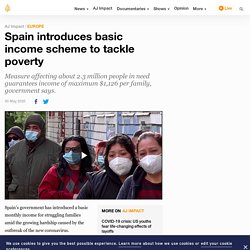
The move announced on Friday was part of last year's coalition agreement between socialist Prime Minister Pedro Sanchez and Pablo Iglesias, the head of the left-wing alliance Unidas Podemos (UP). More: The inequalities exposed by this pandemic are about to get even worse. As the beginning of the end of lockdown comes into view in England, a new fear should be taking shape.
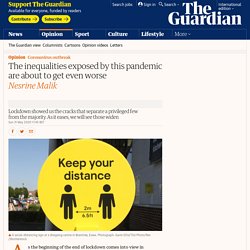
We entered the pandemic a grossly unequal society; we will leave it with those inequalities sharpened and multiplied. This is a pandemic of two halves. How Bad Is Unemployment? ‘Literally Off the Charts’ The American economy plunged deeper into crisis last month, losing 20.5 million jobs as the unemployment rate jumped to 14.7 percent, the worst devastation since the Great Depression.
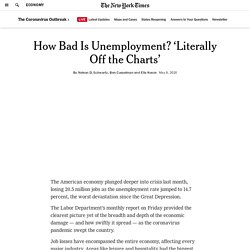
The Labor Department’s monthly report on Friday provided the clearest picture yet of the breadth and depth of the economic damage — and how swiftly it spread — as the coronavirus pandemic swept the country. Job losses have encompassed the entire economy, affecting every major industry. Areas like leisure and hospitality had the biggest losses in April, but even health care shed more than a million jobs.
Low-wage workers, including many women and members of racial and ethnic minorities, have been hit especially hard. “It’s literally off the charts,” said Michelle Meyer, head of U.S. economics at Bank of America. Unemployment rate Source: Department of Labor From almost any vantage point, it was a bleak report. The great reversal - Covid-19 is undoing years of progress in curbing global poverty. Editor’s note: Some of our covid-19 coverage is free for readers of The Economist Today, our daily newsletter.
For more stories and our pandemic tracker, see our hub JANE KABAHUMA has been eating one meal a day since the end of March, when the lockdown began. She used to work in a hotel, but it had to close, along with most businesses in Uganda. She thinks “it will take time” before the work comes back. In five months she is expecting a baby; it may arrive before a job does. “Our formal economy is only possible because it’s subsidized by women’s unpaid work.” — Nahla Valji, the senior gender adviser to the Secretary General of the United Nations. What 30 Percent Unemployment Looks Like.
State intervention may be back, but don't assume neoliberalism is dead. Some people say it doesn’t even exist – that it’s “meaningless”, or even “a term of abuse”. But from the 2008 financial crisis to the vote for Brexit in 2016, from the rise of the alt-right to the Covid-19 pandemic, there is no way of properly grasping our world without thinking about how neoliberalism informs our politics and economy. But what is it? Broadly speaking, neoliberalism can be defined as the raft of policies and overarching political ethos that enabled governments in the late-1970s to turn away from state-directed economic planning, towards an economic model that extended competitive markets into every sphere of human activity and initiated the reign of finance capital (the kind dreamed up in the City of London and Wall Street) by removing constraints on capital mobility.
So, where does the ideology stand today? Remote work is good for business, and the world. In the last few months, as it became clear that the rapid spread of the novel coronavirus would eventually overwhelm health services, governments around the world started to mandate social distancing in public places to protect their citizens. Social distancing, which typically involves keeping a certain distance from others and avoiding large gatherings, is a sound non-pharmaceutical intervention commonly used during epidemics.
It prevents person-to-person transmission of contagions and helps authorities to contain disease outbreaks. In response to the COVID-19 pandemic, many countries not only mandated basic social distancing, but also closed down schools, shops and offices, cancelled all conferences and meetings, and banned domestic and international travel. It's no accident Britain and America are the world's biggest coronavirus losers. There’s something profound about the irony. The world’s highest coronavirus death tolls belong to two countries whose leaders came to power promising the restoration of greatness and control – the United States and Great Britain.
Neither can claim to have been caught by surprise: both nations had the benefit of time, ample scientific warnings, and the cautionary examples of China and Italy. The similarities are striking, the conclusions unavoidable. Here in the UK, we comforted ourselves with the belief that while our own buffoonish rightwing leader had his faults, at least he was no Donald Trump.
But in the end, Boris Johnson has managed to stumble over even this lowest of hurdles. Two nations that prided themselves on their extraordinary economic, historical and political status have been brought to their knees. Over the past four years, reckless political decisions were justified by subordinating reality to rhetoric. . • Nesrine Malik is a Guardian columnist. Law firms repay millions of dollars in unneeded wage subsidies. The 90% economy - Life after lockdowns. Not quite all there - The 90% economy that lockdowns will leave behind. The Coming Greater Depression of the 2020s by Nouriel Roubini. While there is never a good time for a pandemic, the COVID-19 crisis has arrived at a particularly bad moment for the global economy. The world has long been drifting into a perfect storm of financial, political, socioeconomic, and environmental risks, all of which are now growing even more acute. America Will Struggle After Coronavirus. These Charts Show Why.
200417 reopening guidance governors. How do we pay for the Covid-19 stimulus package? Latin America Confronts the Coronavirus by Fernando Henrique Cardoso, et al. Coronavirus has destroyed the myth of the deficit. Only a month ago, a stimulus bill of $2tn would have been unthinkable. Picking off the weak - How deep will downturns in rich countries be? How Covid-19 will damage the economy, according to Treasury. When Will Coronavirus Social Distancing Be Over? Our Pandemic Summer. What we do now will shape New Zealand’s future. Roger Dennis. Coronavirus: 'World faces worst recession since Great Depression' Coronavirus economy plans are clear: No return to normal in 2020. Economic Scenarios. Travel - Five countries with the most resilient economies. What can COVID-19 tell us about capitalism? The economic effects of the coronavirus around the world.
Stakeholder capitalism is urgently needed - and the COVID-19 crisis shows us why. 2nd wave. Full. Coronavirus economy plans are clear: No return to normal in 2020. The coronavirus recession, explained in 9 economic charts. Why the Global Recession Could Last a Long Time.
Households may remain agitated and risk averse, making them prone to thrift. Some social distancing measures could remain indefinitely. Consumer spending amounts to roughly two-thirds of economic activity worldwide. If anxiety endures and people are reluctant to spend, expansion will be limited — especially as continued vigilance against the coronavirus may be required for years. – barbaragrieve
Economic recovery? OECD: Evaluating the Initial Impact of COVID Containment Measures on Activity - Austaxpolicy: The Tax and Transfer Policy Blog. OECD Economic impact.